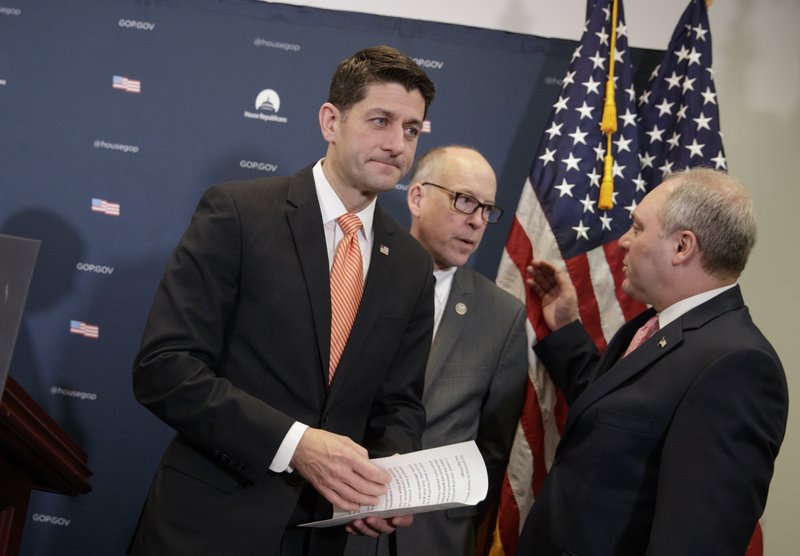WASHINGTON -- Top House Republicans unveiled a rough sketch of a health care overhaul to lawmakers Thursday, but a lack of detail, cost estimates and GOP unity left unresolved the party's plan to pass it through Congress.
RELATED ARTICLES
http://www.arkansas…">Trump condemns leaks http://www.arkansas…">New U.S. travel ban on the way http://www.arkansas…">Eateries, schools shut as immigrants protesthttp://www.arkansas…">Israel-envoy pick apologizes for insults, vows to changehttp://www.arkansas…">White House budget chief sworn in http://www.arkansas…">U.S. signals no shift on Russia http://www.arkansas…">U.N., Arab bloc: 2 states favored http://www.arkansas…">With FHA rate cut off, Trump's policy for housing blurry http://www.arkansas…">Northwest Arkansas students miss school, business close for A Day Without Immigrants
At a private meeting in the Capitol basement, House Speaker Paul Ryan, R-Wis., and other party leaders described a broad vision for voiding much of President Barack Obama's 2010 statute and replacing it with conservative policies. It features a revamped Medicaid program for the poor, tax breaks to help people pay doctors' bills and federally subsidized state pools to assist those with costly medical conditions in buying insurance.
Lawmakers called the ideas options, and many were controversial. One being pushed by Ryan and other leaders would replace the tax increases in Obama's law with new levies on the value of some employer-provided health plans -- a political no-fly zone for Republicans averse to tax boosts.
"You have to legislate with a sense of political reality," said Rep. Tom Cole, R-Okla., who said backing that proposal "would set up an ad against you from multiple directions" during upcoming elections.
[PRESIDENT TRUMP: Timeline, appointments, executive orders + guide to actions in first 100 days]
The scant health care progress mirrors a lack of movement on other issues in a government run by the GOP. No proposals have surfaced to pursue President Donald Trump's campaign promises to build a border wall with Mexico or buttress the nation's infrastructure, and Republicans have yet to coalesce around another priority, revamping the nation's tax code.
Senate Republicans have criticized a House GOP plan to change how corporations are taxed. Trump has said he will release his own proposal in the coming weeks, but nothing had been produced.
"At some point we need to move from imaginary made-up plans to things that you can read on paper," said Sen. Mark Warner, D-Va.
The health care outline was aimed at giving Republicans something to exhibit during next week's congressional recess, at a time of boisterous town-hall-style meetings packed with supporters of the Patient Protection and Affordable Care Act. Ryan told reporters that Republicans would introduce legislation voiding and replacing the statute after Congress returns in late February but offered no specifics.
Many Republicans took an upbeat tone after Thursday's meeting, with Rep. Peter King, R-N.Y., saying, "We're only 27 days into the new administration, so we have time."
But they have repeatedly failed for seven years to rally behind a substitute plan, and there are no guarantees of success in replacing a law that has extended coverage to 20 million Americans.
"We're not going to get out of this overnight," Rep. Bill Huizenga, R-Mich., said of the overall effort.
According to documents distributed to members, the expansion of Medicaid to millions of additional low-income people -- almost entirely financed by federal taxpayers -- would be phased out. Extra Medicaid money would flow to the 31 states that accepted that expansion and the 19 that didn't, though it would end "after a certain date" left unspecified.
After that, states would get far more discretion to decide who would be covered by Medicaid. They also would decide whether to receive federal Medicaid funds on the basis of the fluctuating numbers of the program's beneficiaries or a set annual amount.
Separately Thursday, Trump's pick to run the government's major health insurance programs said Medicaid needs a full overhaul but she doesn't support turning Medicare into a "voucher" plan.
Indiana health care consultant Seema Verma testified before the Senate Finance Committee on her nomination to lead the Centers for Medicare and Medicaid Services. The $1 trillion agency oversees programs that cover about 1 out of 3 Americans.
Verma offered some clues as to her thinking but also deflected many questions. Sen. Ron Wyden of Oregon, the ranking Democrat on the panel, later called the exercise "a missed opportunity for the nominee."
Republicans praised her performance, but two GOP senators said they were very concerned that revamping Medicaid could leave tens of thousands uninsured in their states.
Information for this article was contributed by Erica Werner, Matthew Daly and Stephen Ohlemacher of The Associated Press
A Section on 02/17/2017
